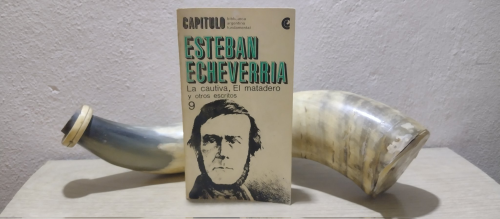Literatura Argentina - Tumblr Posts
Book Review: La Cautiva, El Matadero y otros escritos, Esteban Echeverría

My favorite quote:
"Since men have no real value to us in politics, but as agents to realize or generate social ideas, we will frankly confess that we wish we saw all those favored by Fortune dethroned at last; we can't conceive progress at all for our nation, if not by having the best and most capable take the initiative of thought and social action, and by best and most capable we mean those who are expression of the highest of virtues, and of the highest intelligence in the country."
This small book includes three of Evecherría's most renowed works, so I'll make a quick comment about each:
La Cautiva (The Captive)
This poems narrates the final days of a young woman, captured by the "indios", from where she manages to escape with her husband, badly injured from the fight. They profess a deep and passionate love for each other, but it's the woman who will be taking center stage while trying to keep her man from death and the dangers of the argentinean desert. It's a very beautifully written poem, enhancening the small figure of that woman in the hot lands dominated by the "savages", characterizing her as a force of nature, of willing to live despite it all, of profound love.
El Matadero (The Slaughterhouse)
This one is a short story, set in one of the most violent times of our "civil war" history: unitarios against federales. The story begins actually with a severe rain that swamped Buenos Aires, making everyone suddenly very anxious in a religious and political sense. But the worst part was that the flood impeded the arrival of several cows to the city's slaughterhouse. When the streets and roads finally allow the transport of the first lot of cows, chaos invades the zone, as one bull has infiltrated the group and is running rampant through the city. It is finally taken down by a "glorious unitario". Parallel to the felled bull, a federal appears in town, refusing to wear the symbols of the unitarios, for which he's punished to death. The valiant defiance of the federal mirrors the violent fight for survival of the bull, but both are just slaughtered for being out of place. The story itself is quite simple and the analogies it presents are easy to understand, but Echverrria writes with such a joyful and witty style, making fun of both sides and the people from his time that his work becomes almost satyrical of the Buenos Aires of the 19th century. I really liked it
Reflexiones
This was a non-fiction section of the book, regarding the political views of Esteban Echeverria. I won't dwelve much into it because it's mostly related to Argentina at the time, but I will highlight the author's knowledge of the academic and literary enviroment of his time.
My other 2024 readings.